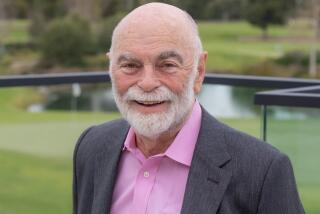Sydney Pollack’s grown-up career
- Share via
With the death of Sydney Pollack at age 73, we mourn not just the end of a man but, unexpectedly, the last days of an era as well.
I say unexpectedly because those kinds of melancholy end-of-days comments are usually reserved for the passing of towering figures of cinema such as Ingmar Bergman or Michelangelo Antonioni. As Pollack himself, a smart and gregarious man, remarkably sane given his long exposure to Hollywood, would have been the first to admit, he was not that kind of filmmaker.
Yet what Pollack stood for is every bit as valuable and even more endangered than the full-blown art-house masterpiece. For this multifaceted filmmaker -- an active director, producer and actor -- was perhaps the last to have a rich and full career making intelligent Hollywood pictures for an adult audience.
Everyone will have his favorites among Pollack’s works, whether it be “Out of Africa,” the film that won him his two Oscars, or “Three Days of the Condor,” one of the many he made with old friend Robert Redford. I lean toward “Tootsie,” the rare comedy that was well-acted and smartly written as well as screamingly funny.
Yet even the Pollack films that didn’t rise to that level presumed that there was an audience for this kind of stuff, that moviegoers who would turn out for thoughtful, well-tempered films about mature characters with grown-up concerns existed. The world where teen bait like “Cloverfield” and “Harold & Kumar Escape From Guantanamo Bay” is the order of the day was not one he felt particularly at home in.
Pollack came by his sensibility honestly. While many contemporary directors came to features via commercials and videos, he came up through acting and study at Sanford Meisner’s Neighborhood Playhouse in New York. Because he cared about drama and emotion, he not only kept acting himself (his turn as an agent in “Tootsie” remains a classic) but also adeptly guided 12 actors to Oscar nominations.
Perhaps because our cowardly new world was not completely to his taste, over the last dozen or so years Pollack directed less and produced more. In fact, according to the Internet Movie Database, since 1995 he produced or executive produced about 25 films and directed only four.
Some of this might be attributable to the difficulty even someone with Pollack’s credentials had in getting his kind of pictures made. But it could also be that the man sensed that he could be of more use putting his experience, contacts and good sense at the service of helping other directors who shared his sensibility and interests get a leg up in the slippery world of Hollywood.
In that context, it is both poignant and fitting that the last film Pollack both produced and acted in was Tony Gilroy’s crackerjack “Michael Clayton,” in which he did his usual faultless turn as the not noticeably ethical head of a major New York law firm. For if there is anyone who might potentially carry Pollack’s mantle, who has the knack of making films that are both smart and classically Hollywood, it is Gilroy.
Though I would run into Pollack from time to time, usually shopping for produce at my local supermarket, I really didn’t know him. And my favorite memory of him comes not from anything he said to me face to face but from a note I received before we’d ever met.
The year was 1982, and I was invited to a rough-cut screening of “Tootsie.” Pollack couldn’t be there in person, but a copy of a typed note from him was handed out to everyone in the room in which the director laid out all the things, from temporary music to scratchy scenes and badly uncorrected color, that were wrong with the print he was presenting.
“Now that I’ve listed all these problems,” Pollack concluded, with perfect comic timing, “I’m not sure why I’m showing the film at all!”
It was soon clear, of course, why he did so. The director knew what he had: Even in its ragged form, “Tootsie” was unmistakably a classic.
Pollack’s passing reminds us, to steal a movie title from the man himself, of the way we were, and perhaps wish we could be again.
--
More to Read
Only good movies
Get the Indie Focus newsletter, Mark Olsen's weekly guide to the world of cinema.
You may occasionally receive promotional content from the Los Angeles Times.











